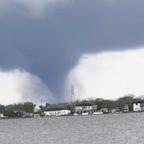Midseason firings like Kevin McHale's only have a placebo effect
— -- It's a classic sports narrative. A slumping team changes coaches then rallies around the replacement to get to the playoffs. That's precisely what the Houston Rockets are hoping for after firing head coach Kevin McHale on Wednesday morning in the wake of a disappointing 4-7 start to a season they expected to spend contending in the Western Conference.
Poor start costs McHale
Starting with a 20-point loss to the Denver Nuggets in the season opener, little has gone right for the Rockets in the season's first three weeks. If anything, their 4-7 start masks how poorly the team has played. Houston has as many losses by 15 or more (four) as wins; only the Philadelphia 76ers have more. As a result, the Rockets' point differential (minus-7.7) is the league's fourth worst.
Even going simply by wins and losses, Houston has underperformed its preseason line by 3.5 wins, the second-largest discrepancy this season behind the injury-battered New Orleans Pelicans. That makes the Rockets one of the largest underachievers relative to preseason line through 11 games in the last decade.
History of midseason coaching changes
Over the last decade, not counting the lockout-shortened 2011-12 campaign, there have been eight midseason coaching changes that roughly corresponded to Houston firing McHale. Specifically, those eight previous teams all had preseason lines that called for at least 41 wins -- meaning the playoffs were a realistic expectation -- and changed coaches in the first half of the season.
On average, those teams won 40.2 percent of their games before the change and 51.6 percent thereafter.
Of the eight teams, just two failed to improve their winning percentage. So, there you have it, proof that changing coaches gets results.
There's only one problem: these teams almost certainly would have played better without any coaching change. Remember, the whole reason their coaches got fired was because -- like this year's Rockets -- they performed worse than expected early in the season.
As it turns out, early in the season a team's expected win percentage (based on preseason lines) predicts how it will perform the rest of the year better than its performance to date. It takes about 20-25 games for this season's performance to become a better predictor than preseason lines, and even then the preseason expectations still hold some predictive value.
The best way to predict a team's record the rest of the season is a combination of preseason line and point differential so far (wins and losses don't improve the prediction once differential has been included), weighted so that the preseason line always counts the same as 20 games. And when we compare the performance of teams that changed coaches midseason to this expectation, their improvement suddenly disappears.
In fact, as a group these eight teams won less than expected based on their point differential and preseason lines the remainder of the season. That's not to say midseason coaching changes can never work. Under P.J. Carlesimo, the 2012-13 Nets played much better in the second half of the season, and the 2005-06 Heat will understandably point to the championship they won after Pat Riley replaced Stan Van Gundy rather than the team's record. Still, midseason coaching changes are hardly the slam dunk they might appear because teams tend to play up to their preseason expectations.
Reasonable expectations for the Rockets
Applying the same formula to this year's Rockets suggests they can be expected to win about 52 percent of their remaining games. That would leave Houston at 41-41, right on the playoff bubble in the Western Conference. That's slightly more optimistic than the 38 wins ESPN's Basketball Power Index predicts on average, with the Rockets reaching the playoffs in 45 percent of BPI simulations.
There are reasons for optimism about a Houston turnaround. The Rockets rank 29th in the league in 3-point shooting (29.0 percent), which is particularly problematic for a team that attempts 37.2 percent of its shots beyond the arc, the league's highest mark. Outside shooting is one of the factors that was likely to regress to the mean no matter the coach.
Houston's ultimate success will probably depend more on the defensive end of the court. Last year's 56-win Rockets team finished with the NBA's sixth-best defensive rating. With virtually the same personnel, Houston has plummeted to 29th this season. Effort has been a major culprit, and McHale's inability to get his team to play hard was surely a key factor in his demise. Simply getting players to buy in defensively will be the biggest task for interim replacement J.B. Bickerstaff.
It's probably already too late for the Rockets to challenge for home-court advantage in the West. Even repeating last year's 56 wins would require Houston to go 52-19 the rest of the way, a 60-win pace over a full season that is better than was expected of the Rockets before their slow start. But there is plenty of time for Houston to get back in the playoff race, and that was true whether the Rockets changed coaches or not.




